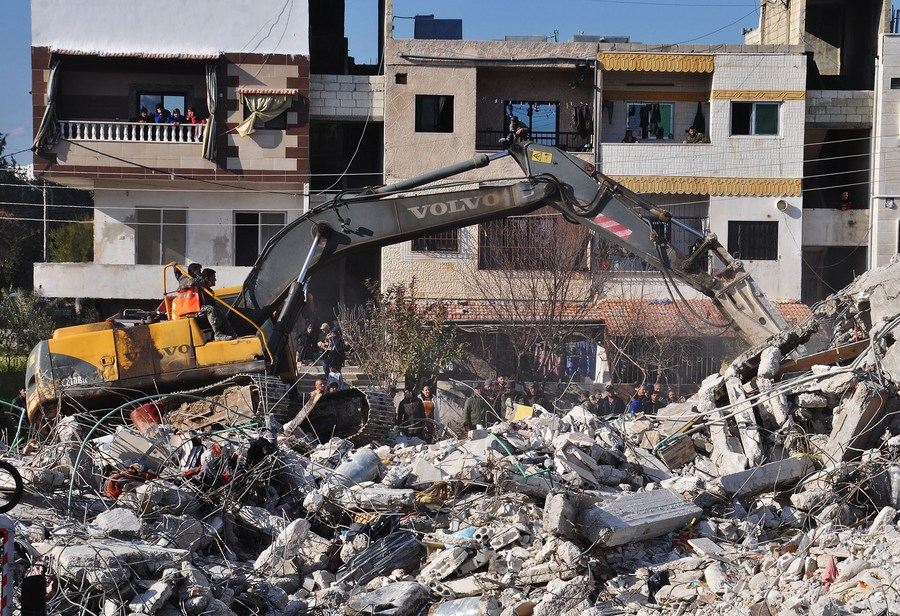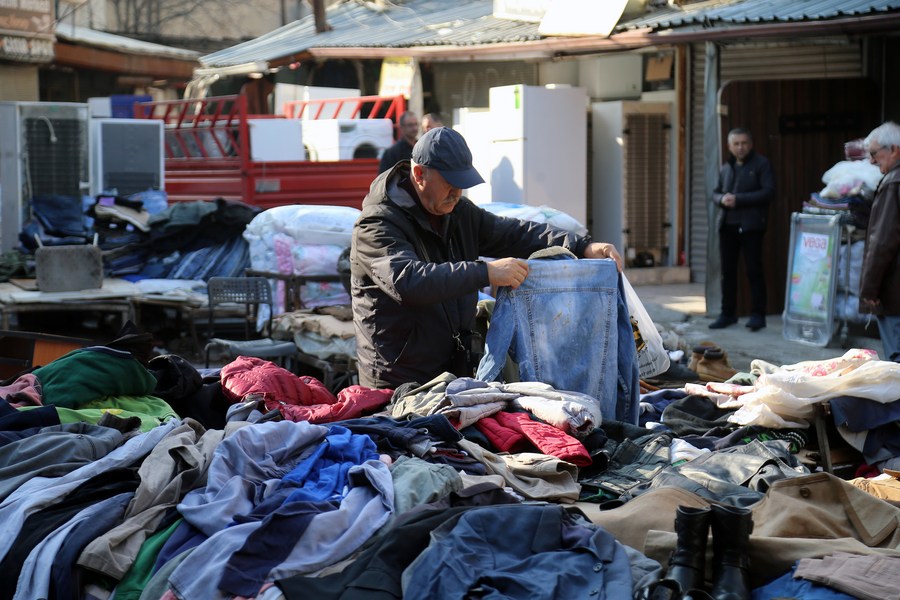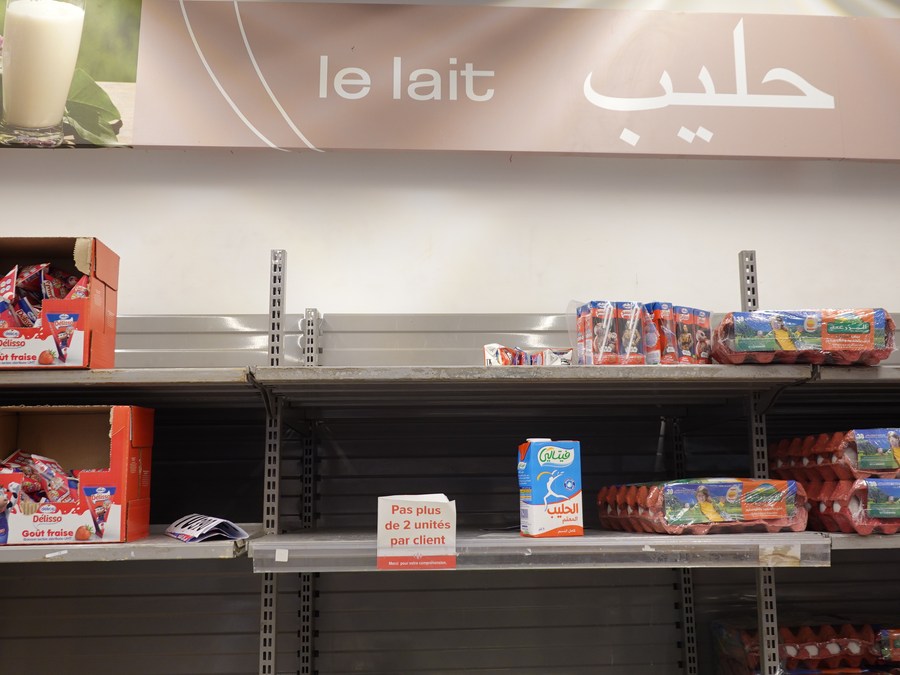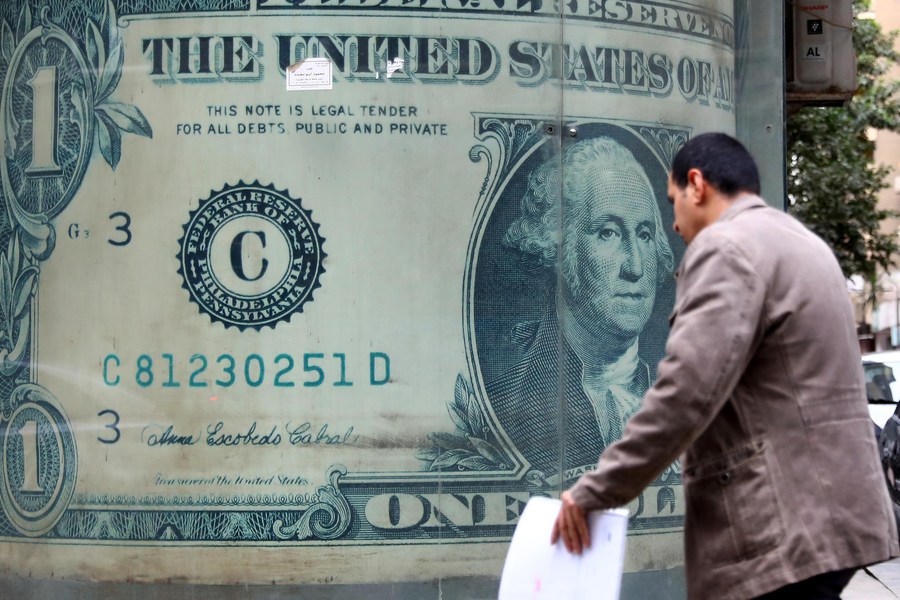* In the face of heavy casualties in Syria, the United States, bowing to international pressure, announced on Thursday a temporary easing of sanctions on the war-torn country. Yet the compromise came too late for too many, whose lives have perished under the rubble while waiting for the much-needed relief aid blocked by the United States. * With the U.S. dollar as the world's leading reserve currency, the United States could use the dollar's overwhelming might to transfer its crisis to the rest of the world, regardless of the repeated warnings by economists that the hikes will disrupt the world economy and foreshadow a recession. * To hedge against the risk of falling into Washington's financial trap, more countries are embarking on the de-dollarization process, exploring ways to circumvent the U.S. currency. by Xinhua writer Shuai Anning CAIRO, Feb. 12 (Xinhua) -- Having been ravaged for years by wars and sanctions, Syria is now being battered again by catastrophic earthquakes on Monday, shattering the dreams of thousands who had hoped for a better life in 2023. In the face of heavy casualties in Syria, the United States, bowing to international pressure, announced on Thursday a temporary easing of sanctions on the war-torn country. Yet the compromise came too late for too many, whose lives have perished under the rubble while waiting for the much-needed relief aid blocked by the United States. Rescuers work at an earthquake-hit site in Latakia, Syria, Feb. 10, 2023. (Str/Xinhua) The tragedy is yet another testament to the U.S. misconduct in the region, which has for years fallen victim to wars, sanctions and inflation "exported" by Washington. UNILATERAL SANCTIONS The U.S. decision to lift sanctions on Syria in the wake of international condemnation contradicts what it has claimed, namely that the sanctions did not target humanitarian aid to the quake-hit country, according to Syrian political experts. "The United States knows that the sanctions imposed on the Syrian people were unjust and led to worsening the living conditions of the Syrians over the past few years," said political expert Kamal al-Jafa. By maintaining the airspace's closure and blocking the entry of any medical or relief equipment to the area, the U.S. sanctions have prevented any effort to help the affected area's residents, said Mazen Shamieh, former assistant minister for the Palestinian Foreign Ministry. Prior to the earthquakes, 90 percent of Syrians live in poverty. In the war-torn country, parents are skipping meals so their children can eat; electricity and fuel are scarcer than ever; many are increasingly unable to access clean water and health care or even to communicate with loved ones or colleagues, because of connectivity outages and failing infrastructure, said UN Special Envoy for Syria Geir Pedersen in December. Salem Abu Al-Oyoun, a displaced Syrian who moved from Aleppo to Al-Wazani camp in southeastern Lebanon, believed that the decision of the U.S. treasury to remove sanctions is a big lie that does not serve the people who have suffered from the unjust U.S. siege. Tawfiq Abu Salwan from Idlib, another refugee who moved to the town of Hasbaya in southern Lebanon, said that the U.S. lifting of part of the sanctions is a desperate attempt to improve and polish its global image. "It will not have any effect on the ground in our country, Syria, and we consider it as non-existent." WORST INFLATION The earthquakes came at a time when life was already hard enough for the people in the Middle East. The double-digit inflation in the region has choked many who have already been struggling to feed themselves. Fuelling their economic woes, many scholars said, is the irresponsible monetary policy of the United States, whose eight consecutive interest rate hikes have disrupted the world economy and dampened the outlook of an economic recovery. In Türkiye, the rising consumer price inflation hit a 24-year high of 85.5 percent in October. A man shops at a second-hand goods market in Ankara, Türkiye, Dec. 6, 2022. Buying and selling second-hand goods has become popular in Türkiye as consumers are looking for affordable used products amid the country's economic woes and soaring inflation. (Photo by Mustafa Kaya/Xinhua) In Lebanon, food prices skyrocketed 143 percent between September and December in 2022, ranking third in food price inflation in the world, according to a World Bank statement. In Egypt, whose currency has lost half of its value from a year ago, the prices of rice and some vegetables have doubled over the course of a few months last year. The price of chicken in January 2023 rose to 72.26 Egyptian pounds (2.39 U.S. dollars) per kilo, a staggering 230-percent increase from 2013. The price of bread witnessed a 460-percent hike in the same period, with 10 loaves of unsubsidized bread now costing 14 Egyptian pounds, up from 2.5 pounds in 2013. Sameer Mousa, a retired veteran living in Amman, the capital of Jordan, said he has not brought fruit home for two months. "The prices are soaring all over the world, but people living in other countries with better salaries can live well. Our salaries are low, even not enough for paying house rent, electricity bills, or water bills," he complained. The picture is much the same in Tunisia, where local residents find it difficult even to get a packet of milk. The shortage of dairy products in Tunisia resulted from the rising price of fodder, which forced many local cow breeders to sell their livestock. Photo taken on Nov. 15, 2022 shows a shelf with a label of purchase restriction on milk at a supermarket in Tunis, Tunisia. (Xinhua/Xu Supei) Youssef Meriah, a 52-year-old cow farmer, used to keep 10 dairy cows and more than 40 sheep in Sidi Thabet, northwest of the capital Tunis. Now he has sold a third of his herd due to the high price of hay. "I, just like many other farmers across the country, was forced to sell our cows as economic conditions worsen," he said. U.S. DOLLAR'S DOMINANCE Jomai Gasmi, a Tunisian political and economic analyst, said the soaring inflation in his country was closely related to the interest rate hikes of the Federal Reserve of the United States. "If you compare the timetable, you can see that the inflation in Tunisia suddenly increased after the Fed hikes," Gasmi said, referring to the U.S. Fed's moves of raising the dollar's interest rate. "It also forced the central bank of Tunisia to raise the interest rate. The last surprise rate rise was on Jan. 14, and the central bank's benchmark rate now stands at 8 percent," Gasmi said. It is impossible for countries like Tunisia and Egypt not to take the Fed's monetary policies into account when making choices because of the dollar's hegemonic status, said Waleed Gaballah, a professor of financial and economic jurisdictions at the Cairo University in Egypt. "The U.S. dollar becomes a more attractive and safer haven for investors after the rises of the interest rate," said Gaballah, noting that since March 2022, a total of 25 billion U.S. dollars of indirect investment in the local debt instruments existed in the Egyptian market. A man passes a foreign exchange office in Cairo, Egypt, Dec. 25, 2022. (Xinhua/Ahmed Gomaa) "When fleeing Egypt, foreign investors needed to buy U.S. dollars, causing a drop in Egyptian pound value," he explained. With the U.S. dollar as the world's leading reserve currency, the United States could use the dollar's overwhelming might to transfer its crisis to the rest of the world, regardless of the repeated warnings by economists that the hikes will disrupt the world economy and foreshadow a recession. Gasmi said that it is "disappointing and infuriating that the U.S. is exporting inflation for its own benefit and making the world pay for it." The dollar's strength has also increased the debt-repayment burdens and deepened poverty in many developing countries, such as Lebanon which is being pushed to the verge of national bankruptcy, Gasmi added. DE-DOLLARIZATION MOMENTUM Adnan Bourji, director of the Lebanese National Center for Studies, said it is such a shame that the Middle East region, with its natural resources and strategic location, should suffer inflation that has been spiraling out of control. Solutions are possible if the dependence on the West and its deadly directives are abandoned, said Bourji, adding that right now the United States and other Western countries still have the upper hand in forming some of the governments in the region and imposing directives to serve its goals. Gaballah said it is "not logical for Egypt's central bank to continue raising the interest rate and follow the U.S. Federal Reserve." He called for a "de-dollarization" approach to limit U.S. irresponsible loosening or tightening of monetary policy in favor of its own interest. To hedge against the risk of falling into Washington's financial trap, more countries are embarking on the de-dollarization process, exploring ways to circumvent the U.S. currency. India, for example, is discussing plans with the United Arab Emirates to settle bilateral transactions in their local currencies. The central banks of South Korea and Australia also extended their currency swap agreement by five years to 2028. As the de-dollarization is gathering momentum, Michael Hudson, a professor of economics at the University of Missouri-Kansas City, noted that putting an alternative monetary system in place will take time. "The whole structure will change and there's still going to be many countries using the dollar. But the dollar will just be like other countries' (currencies). It will have to pay its own way," Hudson said. "It can't just issue dollar debt without pressure." (Video reporters: Shuai Anning, Li Rui, Yao Bing, Xu Supei, Liu Zongya, Ji Ze, Wang Bingfei, Zhang Tianlang, Wang Tengfei, Liu Weijian, Hummam Sheikh Ali, Yang Yiran, Yu Fuqing, Wang Jian, Monsef Memari; video editors: Yu Jiaming, Zhu Jianhui, Hui Peipei, Peng Ying)
U.S. unilateral sanctions, dollar hegemony compound woes of Mideast countries
Editor:谭婕倪
Source:Xinhua
Updated:2023-02-13 11:38:38
Source:Xinhua
Updated:2023-02-13 11:38:38
Special
Contact
Welcome to English Channel! Any suggestion, welcome.Tel:0731-82965627
lisl@rednet.cn
zhouqian@rednet.cn















